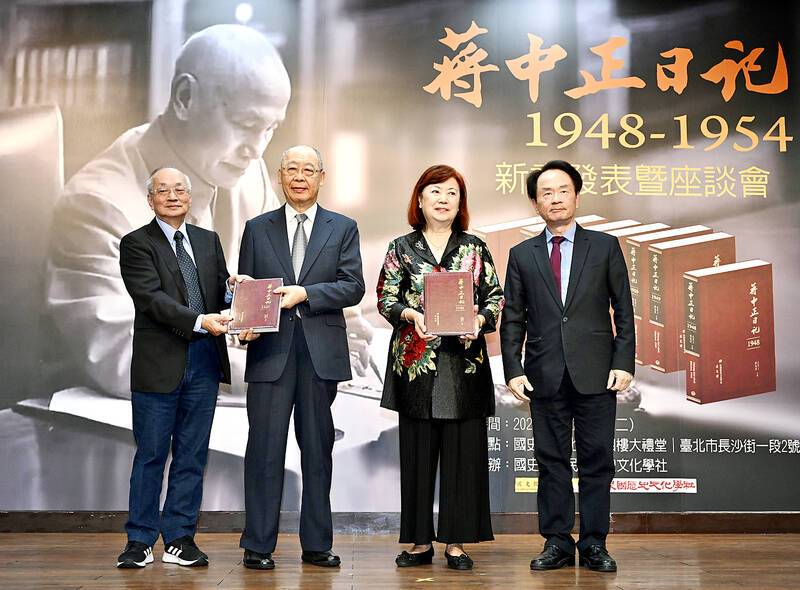The publication of former president Chiang Kai-shek’s (蔣介石) diaries, which were recently returned to Taiwan following a decade-long legal battle, is a form of “social reconciliation and progress,” Academia Historica said yesterday.
The seven-volume collection from 1948 to 1954, published by the Republic of China History and Culture Society, covers Chiang’s first term as president and the pivotal period during which he retreated to Taiwan after losing the Chinese Civil War.
More diaries covering Chiang’s later years in office are to be published from next year, the National Archives Administration said, adding that it plans to publish the 1970-1979 diaries of his son, former president Chiang Ching-kuo (蔣經國), later this year.

Photo: Lo Pei-de, Taipei Times
The content is to be uploaded to the state archives’ online database from March next year.
Academia Historica President Chen Yi-shen (陳儀深) told a news conference in Taipei that the publication of the diaries of Chiang Kai-shek — who remains a highly controversial figure in Taiwan — should be seen as “a form of social reconciliation and progress.”
Citing his own experience, Chen encouraged readers to avoid seeing Chiang Kai-shek in black-and-white terms, and instead read the diaries carefully within the historical context.

Photo: Lo Pei-de, Taipei Times
“Without a doubt, the diaries are important historical documents and cultural treasures,” Zhongzheng Cultural and Education Foundation president Chiang Fang Chih-yi (蔣方智怡) said in a speech at an event marking the occasion.
She pointed to the details recorded in the diaries that Chiang Kai-shek had kept over a span of about 50 years.
Chiang Fang — who was married to Chiang Ching-kuo’s third son, Chiang Hsiao-yung (蔣孝勇) — signed an agreement with Stanford University’s Hoover Institution to keep the diaries for 50 years starting from 2005.
Academia Historica in 2013 said she had signed an agreement with it to take over the documents, leading to a protracted legal battle that culminated with the return of the diaries in September, when Academia Historica received 59 boxes of documents kept by the former presidents from 1917 to 1979.
Chiang Fang said that people who are critical of Chiang Kai-shek should consider the circumstances he faced as leader of the Republic of China, such as fighting Japan, while also combating communists.
The achievements Taiwan enjoys today should be considered when analyzing the endeavors of those who came before, she added.
Chiang Fang concluded by referring to a statement from Chiang Kai-shek’s will, encouraging Taiwanese to “revive democratic culture and safeguard democracy.”
One of the collection’s most notable passages is Chiang Kai-shek’s description of leaving Chengdu — the last Nationalist-controlled city in China — on Dec. 10, 1949. He left the city after learning that then-Yunnan Province governor Lu Han (盧漢) had defected to the communists and asked the leader of the then-Hsikang Province (a region now part of Sichuan Province) to help capture Chiang Kai-shek.
After holding meetings that morning, Chiang Kai-shek boarded a 2pm flight at Chengdu’s Fenghuangshan military airport and arrived in Taipei that evening, where he was taken directly to the Grass Mountain Chateau on Yangmingshan.
Perhaps unexpectedly given the circumstances, Chiang’s diary entry for that day praises the “mild air” and “peaceful environment” in Taiwan, which he compared with the “gloom” that had settled over wartime Chengdu.

SECURITY: As China is ‘reshaping’ Hong Kong’s population, Taiwan must raise the eligibility threshold for applications from Hong Kongers, Chiu Chui-cheng said When Hong Kong and Macau citizens apply for residency in Taiwan, it would be under a new category that includes a “national security observation period,” Mainland Affairs Council (MAC) Minister Chiu Chui-cheng (邱垂正) said yesterday. President William Lai (賴清德) on March 13 announced 17 strategies to counter China’s aggression toward Taiwan, including incorporating national security considerations into the review process for residency applications from Hong Kong and Macau citizens. The situation in Hong Kong is constantly changing, Chiu said to media yesterday on the sidelines of the Taipei Technology Run hosted by the Taipei Neihu Technology Park Development Association. With

CARROT AND STICK: While unrelenting in its military threats, China attracted nearly 40,000 Taiwanese to over 400 business events last year Nearly 40,000 Taiwanese last year joined industry events in China, such as conferences and trade fairs, supported by the Chinese government, a study showed yesterday, as Beijing ramps up a charm offensive toward Taipei alongside military pressure. China has long taken a carrot-and-stick approach to Taiwan, threatening it with the prospect of military action while reaching out to those it believes are amenable to Beijing’s point of view. Taiwanese security officials are wary of what they see as Beijing’s influence campaigns to sway public opinion after Taipei and Beijing gradually resumed travel links halted by the COVID-19 pandemic, but the scale of

A US Marine Corps regiment equipped with Naval Strike Missiles (NSM) is set to participate in the upcoming Balikatan 25 exercise in the Luzon Strait, marking the system’s first-ever deployment in the Philippines. US and Philippine officials have separately confirmed that the Navy Marine Expeditionary Ship Interdiction System (NMESIS) — the mobile launch platform for the Naval Strike Missile — would take part in the joint exercise. The missiles are being deployed to “a strategic first island chain chokepoint” in the waters between Taiwan proper and the Philippines, US-based Naval News reported. “The Luzon Strait and Bashi Channel represent a critical access

Pope Francis is be laid to rest on Saturday after lying in state for three days in St Peter’s Basilica, where the faithful are expected to flock to pay their respects to history’s first Latin American pontiff. The cardinals met yesterday in the Vatican’s synod hall to chart the next steps before a conclave begins to choose Francis’ successor, as condolences poured in from around the world. According to current norms, the conclave must begin between May 5 and 10. The cardinals set the funeral for Saturday at 10am in St Peter’s Square, to be celebrated by the dean of the College